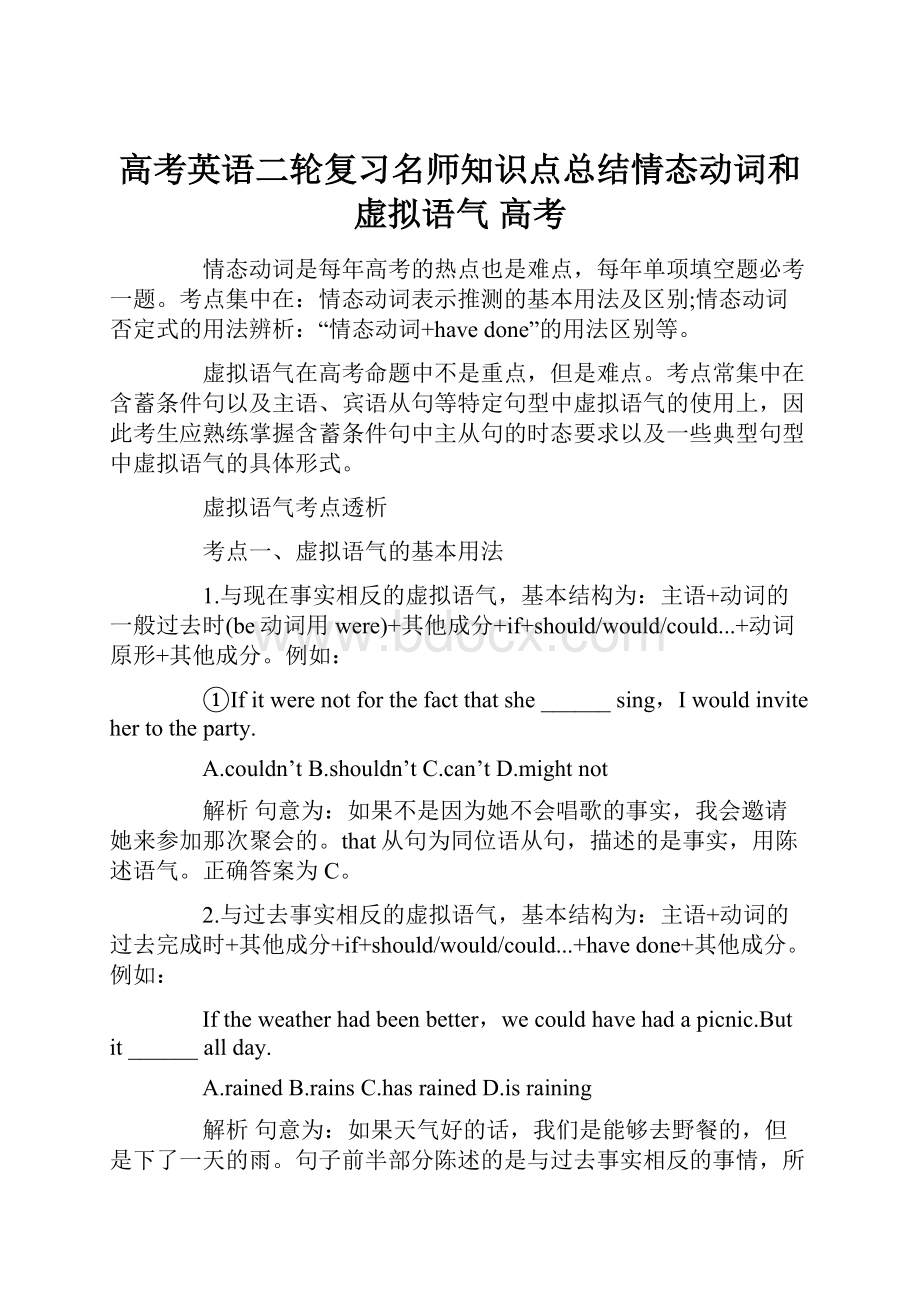高考英语二轮复习名师知识点总结情态动词和虚拟语气 高考.docx
《高考英语二轮复习名师知识点总结情态动词和虚拟语气 高考.docx》由会员分享,可在线阅读,更多相关《高考英语二轮复习名师知识点总结情态动词和虚拟语气 高考.docx(14页珍藏版)》请在冰豆网上搜索。

高考英语二轮复习名师知识点总结情态动词和虚拟语气高考
情态动词是每年高考的热点也是难点,每年单项填空题必考一题。
考点集中在:
情态动词表示推测的基本用法及区别;情态动词否定式的用法辨析:
“情态动词+havedone”的用法区别等。
虚拟语气在高考命题中不是重点,但是难点。
考点常集中在含蓄条件句以及主语、宾语从句等特定句型中虚拟语气的使用上,因此考生应熟练掌握含蓄条件句中主从句的时态要求以及一些典型句型中虚拟语气的具体形式。
虚拟语气考点透析
考点一、虚拟语气的基本用法
1.与现在事实相反的虚拟语气,基本结构为:
主语+动词的一般过去时(be动词用were)+其他成分+if+should/would/could...+动词原形+其他成分。
例如:
①Ifitwerenotforthefactthatshe______sing,Iwouldinvitehertotheparty.
A.couldn’tB.shouldn’tC.can’tD.mightnot
解析句意为:
如果不是因为她不会唱歌的事实,我会邀请她来参加那次聚会的。
that从句为同位语从句,描述的是事实,用陈述语气。
正确答案为C。
2.与过去事实相反的虚拟语气,基本结构为:
主语+动词的过去完成时+其他成分+if+should/would/could...+havedone+其他成分。
例如:
Iftheweatherhadbeenbetter,wecouldhavehadapicnic.Butit______allday.
A.rainedB.rainsC.hasrainedD.israining
解析句意为:
如果天气好的话,我们是能够去野餐的,但是下了一天的雨。
句子前半部分陈述的是与过去事实相反的事情,所以用了虚拟语气。
“下了一天的雨”是事实,所以用陈述语气。
因为是发生在过去的事实,所以正确答案为A。
3.与将来事实相反的虚拟语气,基本结构为:
主语+动词的一般过去时/shoulddo/weretodo+其他成分+if+should/would/could...+动词原形+其他成分。
例如:
IfI______plantodoanythingIwantto,I’dliketogotoTibetandtravelthroughasmuchofitaspossible.
A.wouldB.couldC.hadtoD.oughtto
解析句意为:
如果我能够计划做我想做的事情,我想去西藏并且尽可能多玩一些地方。
句子描述的是与将来事实相反的事情,所以正确答案为B。
考点二、含蓄虚拟条件句
这样的虚拟句不含有if从句,而是以butfor/without/or/otherwise等引导的句子代替if从句,主句的谓语动词的形式与前面虚拟语气的基本用法相同。
例如:
Thankyouforallyourhardworklastweek.Idon’tthinkwe______itwithoutyou.
A.canmanageB.couldhavemanaged
C.couldmanagedD.canhavemanaged
解析由语境可知这里要表达的意思是:
如果没有你们辛勤的工作,我们不可能处理好这件事。
很显然,这是对过去发生的事实的虚拟,所以要用couldhavedone,故应选B。
考点三、主从句时间不一致的虚拟条件句
在有些虚拟条件句中,主从句时间不一致,应根据不同情况区别对待。
例如:
It’shardformetoimaginewhatIwouldbedoingtodayifI______inlove,attheageofseven,withtheMelindaCoxLibraryinmyhometown.
A.wouldn’thavefallenB.hadnotfallen
C.shouldfallD.weretofall
解析句意为:
如果不是我在七岁时爱上家乡的MelindaCox图书馆的话,很难想象今天的我会是什么样子。
主句描述的是与现在事实相反的事情,从句描述的是与过去事实相反的事情。
正确答案为B。
考点四、名词性从句中的虚拟语气
在含有表示坚持、建议、命令、要求等含义的名词性从句和在it做形式宾语或形式主语的复合句中,宾语补足语是necessary/strange/essential/natural/apity/ashame等表示“惊奇、惋惜或者理应如此”等含义时,从句中的谓语动词需用“should+动词原形”,其中should可以省略。
例如:
—Don’tyouthinkitnecessarythathe______toMiamibuttoNewYork?
—Iagree,buttheproblemis______hehasrefusedto.
A.willnotbesent;thatB.notbesent;that
C.shouldnotbesent;whatD.shouldnotsend;what
解析问句句意为:
难道你不认为必须把他送到迈阿密而不是纽约吗?
句子表示理应如此的意思。
正确答案为B。
情态动词考点透析
考点一、情态动词基本含义的考查
情态动词的基本含义,一直是高考考查的重要内容。
例如:
1.Thefirespreadthroughthehotelveryquicklybuteveryone______getout.A.hadtoB.wouldC.wasabletoD.could
解析:
考查情态动词的基本含义。
hadto:
不得不;would:
表示意愿或过去常常;could倾向于表示经过长期训练而获得的能力;wasableto表示经过努力而能够做到的事或成功地做了某事。
因此,答案是C。
分析:
高考对情态动词基本含义的考查,仍然集中在常用的情态动词上。
对常用情态动词的含义,要掌握的既准确又要全面,特别是shall,should,can,may四个常用情态动词的含义较多,不易理解,复习时应当引起重视。
二、情态动词表示推测的考查
对情态动词表示推测的用法,是高考考查情态动词的一个重要方面。
例如:
1.Sorry,I’mlate.I______haveturnedoffthealarmclockandgonebacktosleepagain.
A.mightB.shouldC.canD.will
解析:
mighthavedone:
(过去)可能做过某事;shouldhavedone:
本应该做某事。
根据本句提供的情境I’mlate表明说话人可能把闹钟关上了。
答案是:
A。
分析:
高考对表示推测的情态动词集中在must,can,could,may,might上,准确掌握它们使用的场合,是解决问题的关键。
Must用于肯定陈述句,表示肯定推测;can,could用于疑问或否定陈述句,表示可能性推测;may,might用于陈述句,表示可能性推测;用于否定陈述句中,can’t(不可能)的语气比maynot(可能不)强。
此外,还要注意有对过去和对现在两种情况的推测,对过去推测用情态动词+havedone,对现在推测用情态动词+动词原形。
三、情态动词表示虚拟的考查
情态动词+have+过去分词表示与过去事实上相反的情况,也是高考单项选择题涉及到情态动词的一个重要方面。
1.Therewasalotoffunatyesterday’sparty.You______come,butwhydidn’tyou?
A.musthaveB.should
C.needhaveD.oughttohave
解析:
oughttohavedone表示本来应该做某事而实际没做,shoulddo表示现在应该做某事,与题中atyesterday’sparty表示的时间不一致。
所以选D。
分析:
高考对情态动词表示虚拟‘用法,表示与过去事实相反的情况。
近几年高考,主要侧重should(not)havedone这一句式上,表示本来不该做却做了或本来该做却未做的事,在复习时,还应关注其它几种虚拟形式,如need(not)havedone表示本来需要做而未做或本来不需要而做的事等等,以做到有备无患。
考点四、情态动词与助动词混合考查
1.Tom,youdidn’tcometothepartylastnight?
—I______,butIsuddenlyrememberedIhadhomeworktodo.
A.hadtoB.didn’tC.wasgoingtoD.wouldn’t
解析:
hadto:
不得不;didn’t:
没来;wasgoingto:
打算来;wouldn’t:
不愿来。
句意:
——汤姆,昨晚你没来参加舞会吗?
——我本打算来,但我突然记起有作业要做。
But是关键词,所以答案是:
C。
2.Yourphonenumberagain?
I______quitecatchit.
—It’s86184867.
A.didn’tB.couldn’tC.don’tD.can’t
解析:
记住电话号码并非难事,未完全听清楚电话号码并非能力的事,此处只是说没有完全听清楚电话号码,所以,应选A。
【精选试题】名校模拟题及其答案
1.“Istillhaven’tthankedAuntLucyforherpresent.”“It’stimeyou_____.”
A.doB.didC.hadD.would
2.IfIhadn’tbeenluckyenoughtomeetyou.Ireally_____whatIwouldhavedone.
A.don’tknowB.hadn’tknown
C.wasn’tknowingD.wouldn’tknow
3.“I’vetoldeveryoneaboutit.”“Oh,I’dratheryou_____.”
A.don’tB.hadn’t
C.couldn’tD.wouldn’t
4.Ithasbeenrainingforaday,buteventhoughithadn’trained,we_____therebytomorrow.
A.can’tgetB.won’tget
C.hadn’tgotD.wouldn’tget
5.“Doyouknowhisaddress?
”“No,IalsowishI_____wherehe_____.”
A.knew,liveB.knew,lives
C.know,livesD.know,lived
6.“Isn’titabouttimeyou_____todomorningexercises?
”“Yes,itis.Wouldyouliketojoinus?
”
A.beginB.havebegun
C.beganD.hadbegun
7.ItishardformetoimaginewhatIwouldbedoingtodayifI____inlove,attheageofseven,withtheMelindaCoxLibraryinmyhometown.
A.wouldn’thavefallenB.hadnotfallen
C.shouldfallD.weretofall
8.Hehesitatedforamomentbeforekickingtheball,otherwisehe____agoal.
A.hadscoredB.scored
C.wouldscoreD.wouldhavescored
9.Ifonlyhe_______quietlyasthedoctorinstructed,hewouldnotsuffersomuchnow.
A.liesB.lay
C.hadlainD.shouldlie
10.Withouttheairtoholdsomeofthesun’sheat,theearthatnight____forustolive.
A.wouldbefreezingcoldB.willbefreezingcoldly
C.wouldbefrozencoldD.canfreezecoldly
11.IforgetwhereIreadthearticle,orI_____ittoyounow.w.w.w..c.o.m
A.willshowB.wouldshowC.amgoingtoshowD.amshowing
12.“Itlooksasifheweredrunk.”“Soitdoes._____.”
A.He’dbettergiveupdrinking
B.Heshouldn’thavedrunksomuch
C.Healthismoreimportantthandrink
D.Iwonderwhyheisalwaysdoingso
13.“Marylookshotanddry”“So_____youifyouhadsohighafever.”
A.doB.areC.willD.would
14.“Hewillcometomorrow.”“ButI’dratherhe_____thedayaftertomorrow.”
A.willcomeB.iscoming
C.cameD.hadcome
15.Allthedoctorsinthehospitalinsistedthathe____badlywoundedandthathe____atonce.
A.shouldbe;beoperatedon
B.were;mustbeoperatedon
C.was;shouldbeoperated
D.was;beoperatedon
16.______smoking,hewouldnothavegotcancerinthelung.
A.WashegivenupB.Hadhegivenupw.w.w..c.o.m
C.DidhegiveD.Ifhegaveup
17.“Istillhaven’tthankedAuntLucyforherpresent.”“It’stimeyou_____.”
A.doB.didC.hadD.would
18.“Doyouknowhisaddress?
”“No,IalsowishI_____wherehe_____.”
A.knew,liveB.knew,livesw.w.w..c.o.m
C.know,livesD.know,lived
19.ItishardformetoimaginewhatIwouldbedoingtodayifI____inlove,attheageofseven,withtheMelindaCoxLibraryinmyhometown.w.w.w..c.o.m
A.wouldn’thavefallenB.hadnotfallen
C.shouldfallD.weretofall
20.Withouttheairtoholdsomeofthesun’sheat,theearthatnight____forustolive.
A.wouldbefreezingcoldB.willbefreezingcoldly
C.wouldbefrozencoldD.canfreezecoldly
21.________fired,yourhealthcareandotherbenefitswillnotbeimmediatelycutoff.
A.WouldyoubeB.Shouldyoube
C.CouldyoubeD.Mightyoube
22.Youcan’timaginethatawell-behavedgentleman_____besorudetoalady.
A.mightB.needC.shouldD.would
23.—Excuseme.ButIwanttouseyourcomputertotypeareport.
—You_____havemycomputerifyoudon’ttakecareofit.
A.shan’tB.mightnotC.needn’tD.shouldn’t
24.He_____havecompletedhiswork;otherwise,hewouldn’tbeenjoyinghimselfbytheseaside.
A.shouldB.mustC.wouldn’tD.can’t
25.I______havebeenmorethansixyearsoldwhentheaccidenthappened.
A.shouldn’tB.couldn’tC.mustn’tD.needn’t
26.There_____beanydifficultyaboutpassingtheroadtestsinceyouhavepracticedalotinthedrivingschool.
A.mustn’tB.shan’tC.shouldn’tD.needn’t
27.Iwasonthehighwaywhenthiscarwentpastfol.Lowedbyapolicecar.They______atleast150kilometersanhour.
A.shouldhavebeendoingB.musthavebeendoing
C.couldhavedoneD.wouldhavedone
28.—I’vetakensomeoneelse’sgreensweaterbymistake.
—It______Harry’s.Healwayswearsgreen.
A.hastobeB.willbeC.mustn’tbeD.couldbe
29.—Catherine,Ihavecleanedtheroomforyou.
—Thanks.You______it.Icouldmanageitmyself.
A.needn’tdoB.needn’thavedone
C.mustn’tdoD.shouldn’thavedone
30.—Lucydoesn’tmindlendingyouherdictionary.
—She_______.I’vealreadyborrowedone.
A.can’tB.mustn’tC.needn’tD.shouldn’t
【答案与解析】
1.
【解析】选B.It’stimeyoudid为It’stimeyouthankedAuntLucyforherpresent之略。
按照英语语法,it’stime后从句通常要用过去式。
2.
【解析】选A.虽然前有虚拟条件句,后有使用了虚拟语气的宾语,但Idon’tknow却宜用一般现在时,因为Idon’tknow表述的是现在的真实情况,句意为“我要不是有幸遇到你,我真不知(指现在不知)我会做出什么蠢事来”。
3.
【解析】选B.I’drather后接从句时,从句谓语的时态规律是:
用过去式表示现在或将来,用过去完成式表示过去。
4.
【解析】选A.wecan’tgettherebytomorrow为客观事实,故宜用陈述语气。
5.
【解析】选B.第一空填knew,因为Iwish后的宾语从句要用虚拟语气(即用过去式表示现在的想法);第二空要填lives,即用陈述语气,因为wherehelives是一个客观事实,而不是Iwish的内容。
6.
【解析】选C.It’stime…/It’shightime…/It’sabouttime…等后接从句时,从句谓语通常用过去式。
7.
【解析】选B.此题涉及错综时间虚拟条件句,主句与现在事实相反,条件句与过去事实相反。
句意为:
要不是在七岁时就迷上了MelindaCox图书馆,我真不能想像我如今会在做什么。
8.
【解析】8.选D.这是otherwise引出的含蓄虚拟语气,再根据前面的hesitated可进一步知道这是与过去事实相反的虚拟语气,由此可推知答案选D.
9.
【解析】选C.ifonly意为“要是……就好了”,其后的句子谓语要用虚拟语气,同时根据a